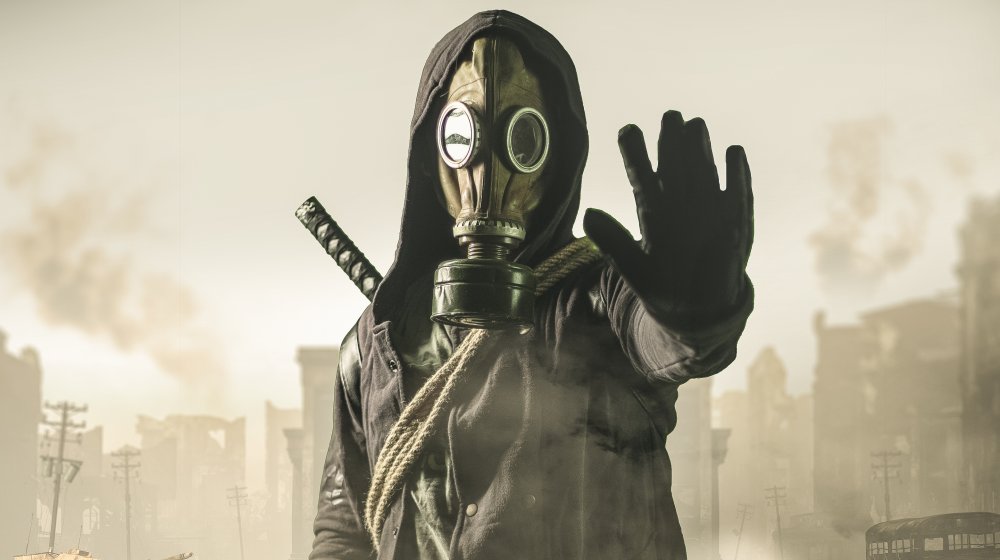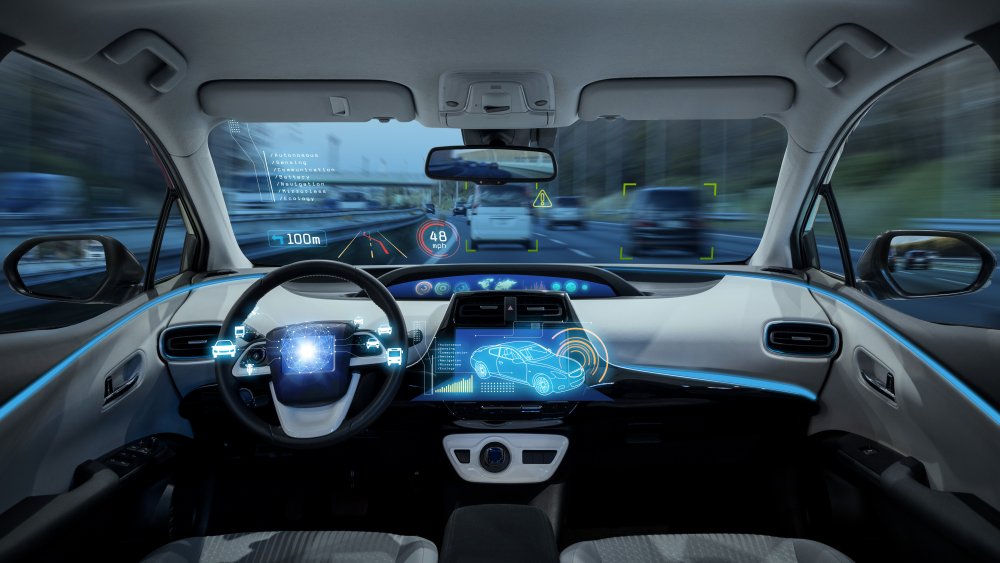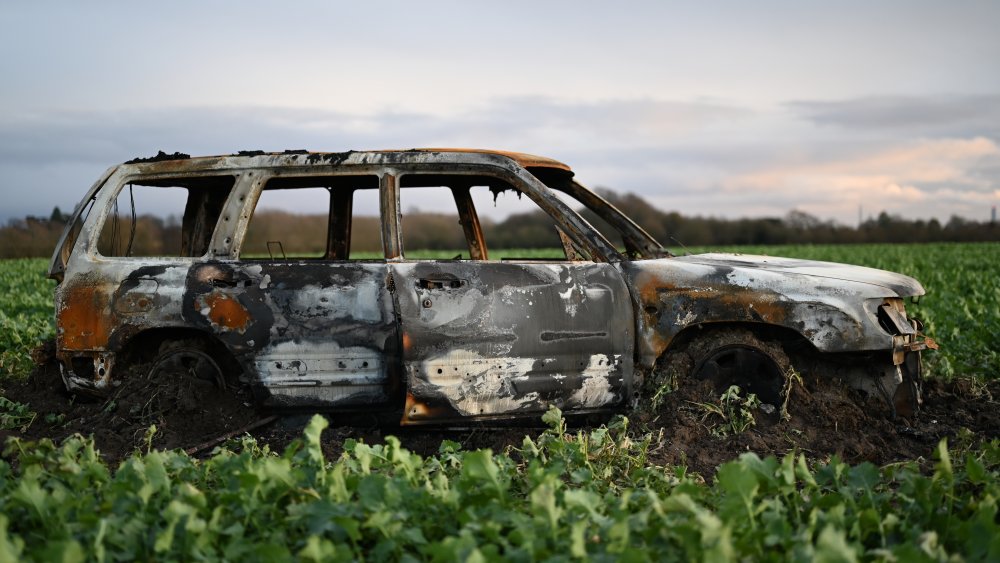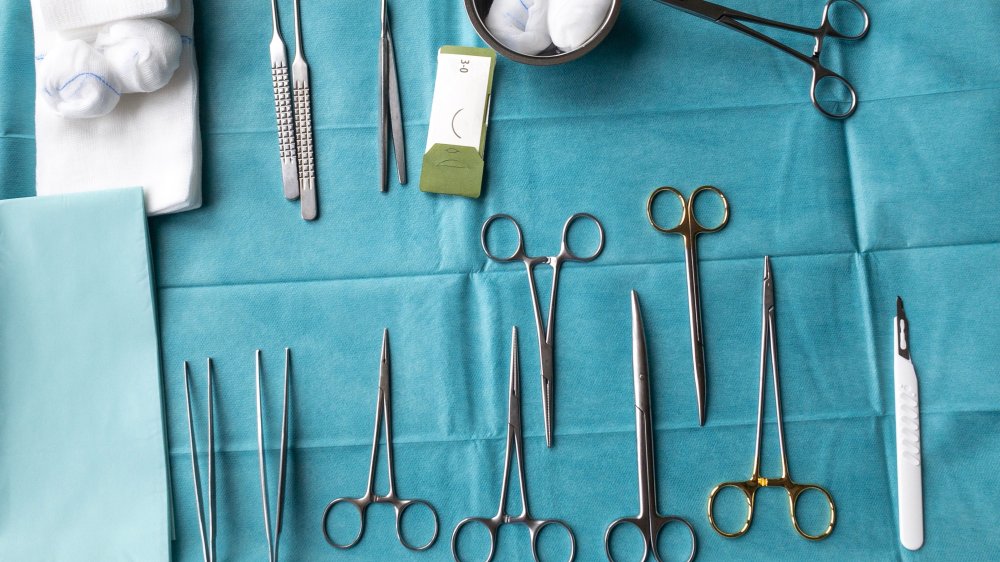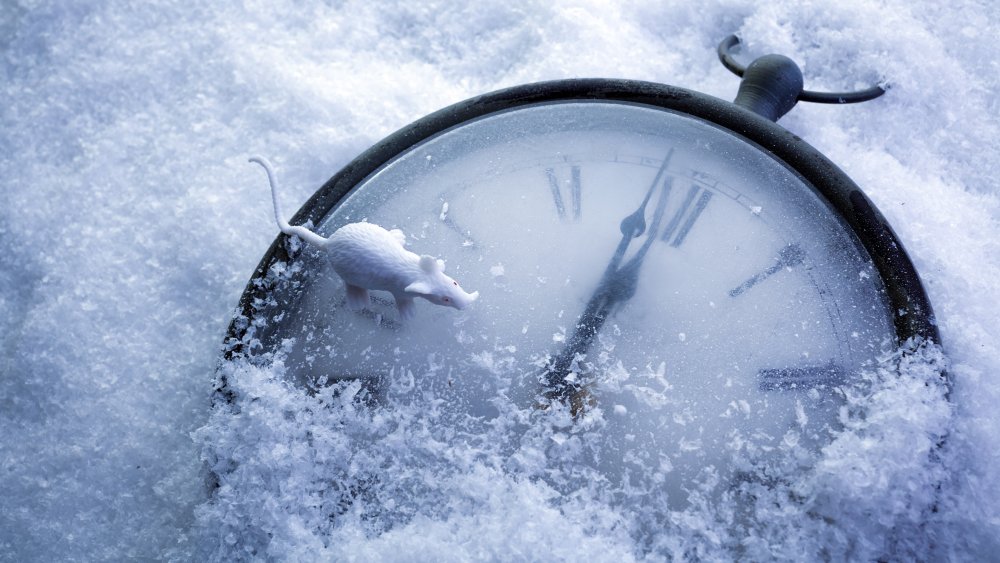The World's Biggest Threats That Few People Know About
The world is a scary place, full of things that can kill you in horrible ways or do so much damage to you that you'll wish you were dead. Now that we've started on a cheery note, let's get even more exciting.
Do some digging, and you'll find that there are even more threats out there than you imagined. We all know we shouldn't drink cleaning chemicals, for example, and we all know we shouldn't go swimming with sharks or try to do a high dive off the roof into the pool. And on a larger scale, we know about things like climate change and the polar ice caps, but do you know how likely it is you're going to be caught in a bridge collapse? Or how likely you are to have your identity stolen ... through your car? And what about threats not just to ourselves but to the entire world? Chances are pretty good that you very regularly do some things that are pushing up the end times.
Should you know about these things? Definitely. Will they make a difference in the way you live your life? Maybe. Regardless, these are the world's biggest threats that few people know about.
Your car's smart technology is more vulnerable than you know
Cars used to be simple things. Straightforward. Basic. You had a radio with dials, and if you wanted to get somewhere, you'd better be good at reading a map. Today's cars, though, you hop in, sync your phone, pull up Google Maps, double-check the address that was texted to you, and you're on your way. See the problem?
In 2017, Vice reported on an in-depth study done by researchers at a security firm, and it's scary stuff. Basically, they found that when you sync your phone with your car, it stores information like emails, contacts, and other data right on the car's infotainment system. And while your computer, tablet, and smartphone are designed with layers of security, cars aren't. Anyone who wants to can just hack your car via a malware program that transmits when it hits a Wi-Fi hotspot.
That's not even the worst news. In 2015, a pair of hackers showed journalists from Wired just how they could hack a Jeep and turn it into a giant remote-controlled car. They had access to everything from the wipers and the A/C to the display screens ... and the ability to cut the car's transmission. Security holes haven't been fixed, either. In 2018, Volkswagen and Audi issued a press release saying they'd found holes in their security that allowed hackers to listen in on conversations in the car, and that's proof technology really is listening.
Infrastructure is failing across the world
When you drive across a bridge, do you worry about collapse? Maybe you should. According to the Infrastructure Report Card, four in ten bridges in the US are 50 years old or older. In 2016, there were 188 million trips each day across the 56,007 bridges deemed "structurally deficient," and how do you like those odds?
It's not just bridges you should worry about, either. Most of the country's water infrastructure was laid in the middle of the 20th century, and those pipes have a lifespan of about 75 years. As a result, every year, there are 240,000 water main breaks, which means we lose more than two trillion gallons of drinking water. Wastewater systems aren't much better, and they aren't equipped to deal with the added pressure of an estimated 56 million new users that are coming in the next few decades. Oh, and dams? Those very important structures responsible for keeping water where it should be? There were 15,500 classified as "high-hazard" in 2016.
And it's not just a US problem. The World Economic Forum says it's global, from the over 300 Italian bridges that are on the verge of collapse to the failing power infrastructure in South Africa, one that leaves scores of people without power for hours on end. They estimate $97 trillion would be required to get the world up to speed, and how likely is that to happen?
Malware is becoming a bigger and bigger threat
The idea of malware is a familiar one — diabolical programs that spread to our devices through the internet. It's why computers that contain highly sensitive information are air-gapped. That is, they're not connected to the internet or to any other device that's connected to our great world wide web (via The SSL Store).
It's easy to see why air-gapped computers are high-priority targets for hackers. After all, they're the ones with the security codes to Fort Knox and the top-secret recipe to Dr. Pepper (we think). And now, hackers have proven they don't even need an internet connection to get into these computers.
There are a few different ways they can do it. In 2013, Ars Technica reported that it was possible to create malware that jumps air gaps with the help of just a microphone and some speakers. Scary enough, but they were only able to get a small amount of data that way. Fast forward to 2018, and ZDNet says other methods have been developed. For example, hackers can target flashing LEDs, use the computer's magnetic frequency to pull data through a Faraday cage, and even get in through power lines. So yeah ... that super-secure, top-secret information? Not so secure and not so secret.
Wall Street is run by algorithms
The long-standing image of Wall Street trading is a lot of guys in expensive but sweat-stained shirts running around very loud offices, yelling "buy!" and "sell!" However, things are pretty different today, says the BBC. Now, Wall Street is pretty much controlled by online trading algorithms, and as if that isn't scary enough, algorithm expert Kevin Slavin had this to say at a 2011 TEDGlobal conference: "We are writing these things that we can no longer read. We've rendered something illegible. And we've lost the sense of what's actually happening in this world we've made."
That's some serious Skynet stuff, and we're already seeing some of the terrible consequences.
May 6, 2010 was the day of the so-called Flash Crash of 2.45, and remember what happened the last time the stock market crashed? Yeah. Essentially, this is what happened. At the time, about 70 percent of Wall Street trading was run by algorithms that decided in a heartbeat when it was time to buy and sell to maximize profit. A single trader's computer algorithm decided it was time to sell 75,000 stocks worth more than $3 billion in just 20 minutes, and that sent all the other algorithms into what can only be described by the highly technical term of "a tizzy."
The market recovered ... that time. What about next time?
One word: Amazon
The general store might've been the lifeblood of small-town America in the 19th century, but fast forward to the 21st century, and that store goes by the name of Amazon. Amazon is everywhere, and it's at the point where even if you don't want to use it, you kind of have no choice. And that's a huge danger.
Amazon's threat is a domino effect. Because they can sell cheaper than brick-and-mortar stores and ship things faster and cheaper than other online retailers, they're pushing out the competition. According to The American Interest, 2017 saw the closure of 8,600 stores, and between 2001 and 2017, the number of department store jobs dropped by around half a million. That's a lot of people out of work, and it's not the only problem.
Amazon — which has a higher value than some states' annual GDP — has a shocking amount of power. According to Vox, the company (which cornered 49 percent of all online sales in 2018) is on Washington's radar in the same way companies like Standard Oil once were. The more market power Amazon gets, the more smaller businesses will close, and ultimately, the less options the consumer will have. There's a very real possibility Amazon could become the only place Americans might be able to buy things from, and what's going to happen to their prices then? A future where it's Amazon and Jeff Bezos who set the value of the nation's goods and services isn't just scary, it's entirely possible.
The threat of your car bursting into flames
Electric cars are new and exciting, but every so often, you'll see a headline about a Tesla's lithium ion battery going up in flames. That's scary, and it also brings up an important question: How likely is it that you're going to be driving along one day, and your car just catches on fire? More likely than you might think.
The headlines treat the Tesla fires as something newsworthy, so it must be odd, right? Not according to CNN, who says it's entirely possible those spontaneously combusting Teslas might be safer than gas cars. Says who? Well, CNN cites an investigation by the National Highway Traffic Safety Administration, which found the dangers of fire from lithium ion batteries is "somewhat comparable to or perhaps slightly less than those for gasoline of diesel vehicular fuels."
In 2015 (the most recent year comprehensive statistics were available for), there were 174,000 vehicle fires reported. While you're still much more likely to be in a fender bender, that's still an average of one car fire every three minutes. Did you know there were that many? No? Now you do, and happy motoring!
Few people know that organ trafficking is a huge problem
Waking up in a bathtub full of ice and finding you're missing a kidney might be a horror movie trope, but according to ACAMS Today, about ten percent of all organ transplants are done with trafficked organs. And it's not entirely surprising. The wait time for organs can be years, and with a high demand, a shady black market trade in organs is inevitable. It's such a problem that the World Health Organization has said they're calling for revising guidelines for organ transplants, including new protections for the world's most vulnerable sector of the population — the poor, who are most likely to be tempted to sell a kidney for as little as a grand.
The headlines are terrifying. In 2016, The Washington Post reported on a raid in Islamabad, where 24 people were being held against their will as they waited to be transported to a clinic to have a kidney harvested. Demand comes from wealthier countries, which often turn to developing countries where people are more likely to agree to sell an organ ... or they'll agree to find one, whether the donor agrees to it or not. It's continuing, too. In 2019, The Guardian reported on another disturbing trend. Migrants trying to escape countries torn by violence and conflict have started selling organs to raise the money to get themselves and their families to safety, and if you think they're being taken advantage of, you're absolutely correct.
The bees are dying, and that's bad news for the world
Honey is delicious, but we can do without it, right? Maybe, but we definitely can't do without the bees.
When researchers from Harvard and the University of Vermont (via PBS) looked at what the continued die-off of the world's honeybee populations means for people, they found some dire things. Bees are such an important part of agriculture that the results could be nothing short of widespread famine. Take Mozambique, where the disappearance of bees could send more than half the country's population into a state of famine and malnutrition.
National Geographic says that bees are involved with about a third of our food production. Sure, you might not miss honey much, but what about apples, berries, tomatoes, grapes, and a whole other slew of fruits and veggies? Fancy a bit of scurvy?
Bees have been dying since the mid-2000s, but it wasn't until 2020 that The Guardian took a look at one of the biggest problems for bees: almonds. Almonds are one of the biggest crops in California and the biggest cash cow for commercial beekeepers. But more and more bee colonies are dying in almond orchards. Over the 2018-2019 winter, around 50 billion bees died. Why? A combination of pesticides, disease, habitat loss, and a loss of diversity in their remaining habitats. And almonds are the biggest culprit. As of 2018, California contained around a million acres of almonds, and for perspective, that's larger than the state of Delaware.
Antibiotics are becoming less effective
You have a toothache, so head to the dentist and get a tooth pulled. You'll also get some antibiotics to clear up the infection, and you're back to eating pizza and peanut brittle in no time. However, it's entirely possible that we might get to the point where that infection is going to kill you instead .. and maybe start a deadly outbreak.
According to the World Health Organization, antibiotic resistance is one of the biggest threats to health — and the food supply — in the 21st century. Basically, the bacteria that cause infections and illnesses like pneumonia, tuberculosis, and various types of food poisoning are becoming more and more resistant to antibiotics. And that means it's becoming harder to treat illnesses, and already more people are dying from things that we could easily treat just a few years ago. The Centers for Disease Control and Prevention estimates that of the 2.8 million people who are infected with these new super bacteria every year, around 35,000 will die.
The problem got out of control for a few reasons. Health professionals have been over-prescribing antibiotics for a long time, and when patients don't follow their instructions to the letter, that doesn't help, either. And neither does the agricultural sector, as its been long using antibiotics on healthy animals to make them increase their size and, ultimately, profits. Oh, and if you're wondering why they don't just invent some new antibiotics, they are ... and the bacteria is likely resistant to those, too.
The dark web is pretty dangerous
The internet is huge. Anyone who's put off doing actual work in favor of surfing the information superhighway knows that you can go days without doubling up on browsing material, but here's the shocking thing. According to estimates by Kaspersky, everyday users only have access to about ten percent of all websites.
The rest exist on the deep web. The definition of the deep web is essentially the part of the internet that's not cataloged by browsers like Google, and there's a huge number of those sites that are completely harmless. Then there's the dark web. That's the part of the uncatalogued sites home to a whole host of illegal activities, and they're only accessible through a special browser and — usually — an invitation from someone already there. According to Interesting Engineering, if you're looking for anything from drugs to credit card numbers to $6 lifetime memberships to Netflix, you can find them on the dark web. And if you're thinking that's going to be driving a lot of very real, physical crimes, you'd be right.
In 2018, Europol reported on a successful operation by the Dutch National Police and the FBI, one that led to the shutdown of two massive dark web marketplaces. Those two sites alone were responsible for the trade of more than "350,000 illicit goods," most of which were paid for in bitcoin. Moral of the story? Just because you can't see something, that doesn't mean it can't hurt you.
The passing of 760 years could be a major threat
The passing of 760 years is a weird thing to consider a threat, but that's the verdict of something called the "doomsday argument."
Here are the basics (via Vox). Princeton astrophysicist J. Richard Gott III started with the idea that everything has a beginning, a middle, and an end. With us so far? Good. He took a look at the beginnings and ends of a lot of things, and he found that past duration was correlated to future duration. There's a lot of complicated math that goes on here, but the end result is an equation that takes the amount of time Homo sapiens have been on Earth and tries to extrapolate how much longer we're going to be around.
Statisticians estimate there were 100 billion people born before you, dear reader. The equation says that's the midpoint, and when another 100 billion people are born, we'll be at the end. Since there's about 130 million people born every year, we'll hit that number in roughly 760 years, at which point we have about a 50/50 chance of ending as a species.
Make sense? No? There are a lot of critics to the theory that call it a sort of mathematical parlor trick, but hey, look on the bright side. If nuclear war wipes out all but a rag-tag group of survivors in a few years, it's going to take us a long, long time to hit that 100 billion number. Win!
We're incapable of knowing what's going to hurt us
Humankind thinks it's pretty smart, with its turbo-charged engines, mega-structures, and Candy Crush. But humans are actually pretty dumb, especially when it comes to foreseeing some of the biggest catastrophes in history.
History shows us that we're completely oblivious when it comes to predicting the most devastating events that end up occurring. We happily discovered radiation and nuclear power, not foreseeing the possibility that this would create weapons that could end all life. Look at climate change. We merrily made our cars bigger and bigger, we used more and more power, and did more and more damage to our oceans, without having the foggiest idea that maybe we should, ya know, not.
There's actually a reason for this, and The Atlantic says it's because we're stupidly optimistic. A score of studies have shown that across the board, the more we want something to happen, the more likely we think it is. On the flip side, the less we want something, the less likely we'll think it is. So what does that mean for our risks? That thing you think it's likely to happen? It probably will. C'mon, zombie apocalypse!
